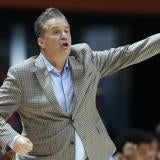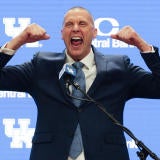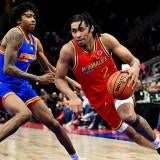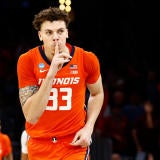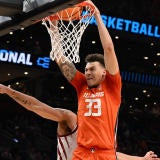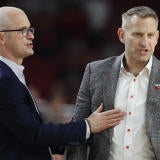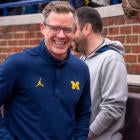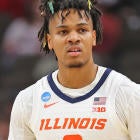
Despite losing a lottery pick in Nik Stauskas -- as well as fellow NBA draftee Glenn Robinson III and big men Jordan Morgan and Jon Horford -- Michigan was still projected to have a strong season. With one of the ten best returning players in college basketball in Caris LeVert, two solid sophomores in Zak Irvin and Derrick Walton, and coach John Beilein coming back, it was assumed the Wolverines wouldn't see much of a drop off from last year's 28-win team.
Fast-forward one month later, and Beilein's team is one of the biggest enigmas in the sport. In its first six games of the year, Michigan picked up solid (if unspectacular) wins over Syracuse and Oregon, and took a still-undefeated Villanova down to the wire on a neutral floor. But in their last two games, the Wolverines have been on the wrong side of two of the biggest upsets of the college basketball season -- home losses to NJIT and Eastern Michigan.
So how does a team go from nearly beating an excellent, experienced Villanova team to losing to a directional school and a technical institute? The answer isn't really that simple.
On Saturday, the defense was the culprit. Sure, NJIT knocked down an awful lot of 3-pointers -- some of which were heavily contested late in the game -- but the Wolverine defense basically rolled out a red carpet and allowed the Highlanders to stroll straight to the rim whenever they wanted.
Obviously some of this was effort-based, and Irvin said as much after the game according to Nick Baumgardner of MLive.
"At times it was there, but it needs to be more consistent," sophomore guard Zak Irvin said of the team's overall intensity. "It wasn't there enough."
And hey, that makes sense. These are 18-to-22-year-old college kids that are in the middle of finals week, so they might not be totally focused on basketball. Maybe they just needed that game as something of a wake up call.
But then, the Eastern Michigan game happens. The Wolverines came out flat again -- which is concerning, given their previous result -- but they lost this one because of their offense. Against the Eagles, the Wolverines shot 32 percent, only grabbed two offensive rebounds and turned the ball over on nearly 22 percent of their possessions. The Eagles' 2-3 zone stifled the Wolverines, even though Michigan had just been successful enough against that same zone a week earlier against Syracuse.
Eastern Michigan coach Rob Murphy -- a former assistant under Syracuse coach Jim Boeheim -- said in an interview after the game on ESPNU that he studied what Michigan did against the Orange in order to shut down the Wolverines' zone offense. However, I'm not sure that even the greatest gameplan in the world could have been solely responsible for Michigan's 0.7 points-per-possession performance -- its worst offensive showing under coach Beilein since Feb. 23, 2010, against Illinois. No, this loss points to some deeper issues that the Wolverines have, which could lead to more variable results throughout the season.
First, Michigan's secondary scoring is a problem. LeVert has lived up to expectations this year, averaging an efficient 18.6 points-per game on gaudy shooting splits. Irvin and Walton have also had solid seasons, with Irvin averaging 15 points and Walton approximately 12. The issues start when you look past those three.
Ricky Doyle, Max Bielfeldt and Mark Donnal are all pretty limited in their ability to create a shot for themselves, which makes sense given their lack of experience. Freshman Kameron Chatman has also looked a little overmatched early on, shooting 28 percent from the field. Spike Albrecht has moments, but he's still more of a streaky outside bomber than a guy you can count on to provide a consistent secondary punch.
Those guys being unable to currently and consistently create for themselves means that Michigan is likely going to be in a dog fight any time one of LeVert, Irvin or Walton don't produce. Against NJIT and Eastern Michigan, that guy was Irvin. In the two games, Irvin was a combined 5 for 23 -- including 3 for 16 from behind the 3-point line -- for only 15 points despite playing all but three minutes of those games.
I don't think that points to any larger discussion about Irvin's skill level or anything. Shooters like him are going to have off nights sometimes. Rather, I think it just goes to show that the margin for error with this team will be extremely small until the younger guys can step up. When one of the "Big Three" struggles, Michigan games could go either way.
It's also worth mentioning that this team is quite reliant on outside shooting, which generally can lead to more variable outcomes. In fact, I would go as far as to say that the Wolverines are settling too often for jump shots instead of attacking the rim.
Currently, Michigan is taking over 40 percent of its field goals from behind the 3-point line and another 41 percent of its shots as midrange jumpers. Relying on outside shooting is fine -- and the Wolverines do it well, shooting 38.2 percent from 3-point range -- but there is a balance to be struck between taking a lot of jumpers and attacking the paint, even for jump-shot-heavy teams. Right now, the Wolverines are on the wrong side of that ledger.
Michigan is only taking 18.2 percent of its shots at the rim this season, which is (wait for it) dead last in the NCAA. Now, this is partially a product of Beilein's two-guard, ball-screen-heavy offense that involves a lot of driving and kicking. The Wolverines have always been in the bottom-30 in that stat over the past three seasons, so it's nothing new necessarily. However, by taking it to the extreme in 2014-15, Michigan is putting itself in a position where it's not creating enough easy looks at the rim in halfcourt sets.
Some fixes for the two aforementioned issues will probably come organically and internally as Doyle and Chatman become more experienced. However, if LeVert and Walton can start turning some of those pull-up midrange shots into shots at the rim, that would likely help given that they're both shooting over 70 percent near the hoop this season.
Until those things start happening though, I think we're going to see a pretty flammable Michigan that will be prone to staying close with good teams as well as suffering unexplainable losses to bad teams. I still believe this is an NCAA Tournament team, even with these losses. It's still finals week in Ann Arbor, so there was at least an explanation for the seeming lack of focus (if not the team questions). Plus, simply put, the LeVert, Walton and Irvin triumvirate would probably be the best group of experienced players to miss the NCAA Tournament in awhile.
But soon, the Wolverines will have to go into Big Ten play, where teams will be much more able to take advantage of these weaknesses. It's clear Michigan has some work to do before then.







